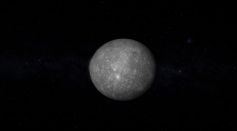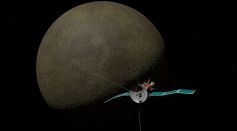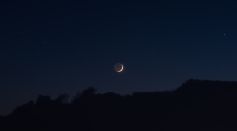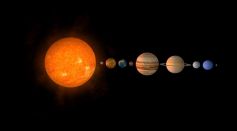Tags: Mercury

Mercury Temperature, Composition and Other Interesting Details Uncovered in New Infrared Imaging

Global Mercury Study Reveals Widespread Contamination in Fishes and Wildlife: How Does This Affect People Eating Them?
Why Is Mercury Liquid at Room Temperature? Exploring the Strange Chemical Behavior of Quicksilver
Mercury-Bound BepiColombo Spacecraft Observes Cold Oxygen and Carbon Ions Escaping the Induced Magnetosphere of Venus
Dancing in Vibrant Hues: NASA Shares Multi-Colored Image of Mercury from Its Messenger Space Probe

Mammalian Brain Cells Found to Contain High Mercury Levels; How Do Wild Terrestrial Species Adapt From Neurotoxins?

Salt Glaciers Evidence Sparks Excitement for Potential Life on Mercury, Scientists Say
Atmospheric Mercury Concentration Increases by Sevenfold Due to Human Emissions; Experts Warn of Potential Environmental Impact
‘Singing’ Plasma Waves Detected Around Mercury For the First Time, Revealing the Secrets of the Planet’s Magnetosphere

Mercury To Peak at Its Highest Point During the Weekend; Here's How To Watch the Swift Planet

Venus, Mercury Will Meet; Delta Aquariids Meteor Shower Will Peak This Week

BepiColombo Probe Discovers Universal Auroral Processes, Revealing Astonishing Findings on Mercury's Atmosphere

From the Start of Perseids Meteor Shower to Views of the Crescent Moon Close to Different Planets: Here Are Some Night Sky Events This Week

Night Sky Events for July 10-16, 2023; Venus, Mercury, Manhattanhenge, and More
BepiColombo Spacecraft’s Captured Images During Its Third Flyby Reveal Geologic Features on the Surface of Mercury
ESA’s BepiColombo Spacecraft Will Make Flyby To Reduce Speed, Enter Mercury’s Orbit in 2025

Mad Hatter Disease Explained: How Does Chronic Mercury Poisoning Lead to Neurological Disorder?

Celestial Event Alert: Moon and Mercury Conjunction Near the Glowing Eye of Taurus Constellation
Planetary Alignment: 5 Planets Jupiter, Saturn, Mercury, Neptune, Uranus Will Make Rare Appearance in the Sky This Weekend

Which Planet in the Solar System Is Closest to Earth? Surprise, It’s neither Venus nor Mars
Most Popular

Viruses vs Bacteria: Key Differences, How They Spread, and How We Treat Them

Recycling Myths vs Facts: What Actually Gets Recycled and How to Do It Right

What Is Conservation Biology? Key Strategies to Protect Species and Habitats

How Ice Cores Reveal Climate History: Insights from Paleoclimate Science and Ancient Data





